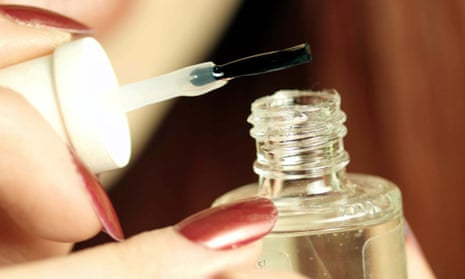There are a lot of things I expect nail polish to do: dry fast, chip infrequently and make me look halfway put-together. Something I don’t generally depend on my manicure for, however, is warding off rapists. But the members of the all-male invention team behind Undercover Colors – four students at North Carolina State University – say that, with their new polish, “any woman will be empowered to discreetly ensure her safety by simply stirring her drink with her finger.”
I’m appreciative that young men like want to curb sexual assault, but anything that puts the onus on women to “discreetly” keep from being raped misses the point. We should be trying to stop rape, not just individually avoid it.
If it were truly that simple, previous iterations of this same concept would have worked. Remember “anti-rape underwear”? Or the truly terrifying “Rapex” – a female condom that would insert tiny hooks into an assailant’s penis? You can’t really expect women to wear modern chastity belts or a real-life vagina dentata in order to be safe. That’s not trying to stop rape - it’s essentially arguing that some people getting raped is inevitable.
Even if a woman were to wear special nail polish or anti-rape underwear, or if she listens to common – but misplaced – advice about not getting drunk and always walking home in a group, all she’s supposedly ensuring is that she won’t be attacked. (And even then it’s not real security, because women who do all the “right” things get raped too) What about the girl at the same party who decided to have a few drinks that night? So long as it isn’t me isn’t an effective strategy to end rape.
Prevention tips or products that focus on what women do or wear aren’t just ineffective, they leave room for victim-blaming when those steps aren’t taken. Didn’t wear your anti-rape underwear? Well what did you expect?
That’s a familiar refrain. In a Bloomberg article last week, for example, one Stanford student compared women who get raped to unlocked bicycles:
‘Do I deserve to have my bike stolen if I leave it unlocked on the quad?’ [Chris] Herries, 22, said. ‘We have to encourage people not to take on undue risk’ that might make them targets of the criminal conduct of others,’ he said.
The problem is that simply being female in public remains an undue risk. Do we really believe that half the population should be required to avoid parties, socializing, drinking, cute clothes and walking alone if they don’t want to be raped?
As former Israeli prime minister Golda Meir said after a cabinet member suggested that women be given a curfew to curb a spate of sexual assaults: “But it’s the men who are attacking the women. If there’s to be a curfew, let the men stay home, not the women.”
If we want to stop rape – not merely avoid it – we need to hold rapists accountable and stop blaming victims.
Much like its tagline (“Choice Matters: The First Fashion Company Empowering Women to Stop Sexual Assault”), Undercover Colors’ polish and products like it only offer the veneer of equality and safety. And that’s simply not good enough.

